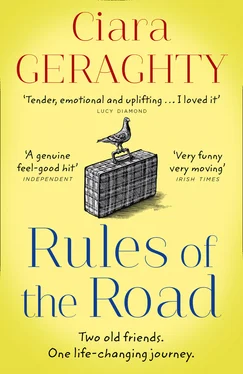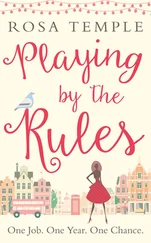‘Well, it’s … it’s really lovely but—’
‘I just need one word,’ explains Jennifer, with end-of-tether patience. ‘An adjective preferably. Okay?’
‘Okay. But … before you begin, could I just quickly ask … do you have anything navy?’
‘Navy?’ she says. ‘What for?’
‘Well, because, you know, I like navy, and—’
‘Nobody likes navy,’ she says. She holds the ensemble – none of which is navy – up again.
‘Garish,’ I manage.
‘Oh. Right. Well done. This one?’
‘Tacky.’
‘Is that not the same as garish?’
‘No. Tacky refers mainly to poor taste and quality whereas garish could be good quality but lurid.’
‘Impressive. This one?’
‘Itchy.’
‘This one?’
‘Skimpy.’
‘This one?’
‘Fussy.’
‘This one?’
‘Scanty.’
‘This one?’
‘Dressy.’
Jennifer runs out of clothes before I run out of adjectives. She lets her now-empty arms hang by her sides, appraises me anew. I can tell she is surprised, and I feel ridiculously pleased about this. Emboldened, I point at a summer dress that I will never wear because it is a linen dress. A linen dress, the colour of early morning mist, that will both crease and stain easily. A linen halter-neck dress that will stop just short of my bony knees, and then there’s the rest of my legs, south of my bony knees, which I’d have to shave, and …
‘Good choice,’ says Jennifer, nodding with naked approval. ‘What else?’
In the end, Jennifer manages to persuade me to buy three carrier bags full, containing:
bright-pink bomber jacket (silk – will have to be hand-washed in cold water);
puffball red skirt (cotton – machine washable);
green leopard-print A-line skirt (acrylic – the washing instructions tag is no longer attached, but I imagine it should be washed inside out, at a safe thirty degrees);
brown (dark-chocolate brown, say 70% cacao) kitten heels, which I will never wear because I never wear heels (suede);
silver-grey ‘boyfriend’ cardigan with long fitted sleeves (80% acrylic, 20% wool, will hand-wash for safety);
a bright-pink tulle high-waisted midi-skirt (as yet unidentified synthetic mix);
a lime-green T-shirt with bright-pink limes all over it (the softest cotton!);
a pale peach cropped jumper with three-quarter-length sleeves (mohair!);
brown ‘gladiator’ summer sandals (leather);
two spaghetti-string tops (1. Scarlet! 2. Orange!!);
one pair of white ‘skinny’ jeans (denim) with – subtle-ish – diamanté detail on back pockets (short, cold-water cycle, add a thimble of vinegar);
a silk shirt-dress, much too short and impractical given the delicacy of the fabric and its shade of palest blue, which Jennifer says is the exact shade of my eyes (strictly dry-clean only);
a black one-shoulder, one-sleeve top, which seems sort of lacking to me, but which Jennifer assures me is made for me, citing my jutty-outy collar bones and my freakishly-long arms. (I forgot to examine the washing instructions before purchase …);
two bras (one a black, lacy affair, and the other so soft and white, it’s impossible to believe it’s ever been through even a delicate cycle);
a straw hat with a pink gingham ribbon that Jennifer, with no trace of irony, says will make me stand out from the crowd.
Oh, and the linen summer dress, at the bottom of the bag, already creased.
Jennifer shakes her head.
‘I didn’t think you had it in you, Terry,’ she says because we’re on a first-name basis now.
‘Neither did I.’ Just because I now own the clothes doesn’t mean I have to wear them. There could be a Marks & Spencer in Dover, couldn’t there?
‘And you have to wear them. I’ll know if you don’t.’ Again that feeling that she can see right inside me. That she knows everything.
I try hard not to tell her anything. I tell her about the girls, obviously.
Brendan says I could go on Mastermind and have the girls as my specialist subject and I’d come away with the chair, quicker than you could say, I’ve started so I’ll finish.
I say I am on a driving holiday with my father and Iris. She doesn’t comment on the fact that I am on holiday without a change of clothes. Instead, she wants to know if Iris is my best friend.
I say, ‘Yes,’ even though the very fact of our friendship continues to remain a surprise to me. We’re like chocolate and chilli, me and Iris.
I do not say that Iris is my only friend. People tend to feel awkward around those who admit to such limitations. I have lots of acquaintances of course. But Iris … well, I don’t think Iris knows how to be an acquaintance.
*
Iris – quite literally – barged through the front door of my quiet, orderly life. Of course, I was aware of her before she did that, since she was the person who was in charge of the Alzheimer’s Society; the chairperson or the managing director or the CEO; I’m not entirely certain of her title, Iris is not one for such things. She joined as a volunteer after her father passed away. The Society had done a lot for Mr Armstrong – who was riddled with dementia, as Iris put it – and Iris said it was her turn to do something for them. So she joined, and within a short period of time, she had given up her job as Sister-in-charge at the Coombe Hospital, and was running the place.
The first time I spoke to her, she asked for my help.
No. That’s not true. She didn’t ask. She just happened to be in the kitchenette at the back of the hall where the Alzheimer’s coffee morning takes place twice a week, struggling with the lid of the coffee jar. She bore down on the jar as if the weight of her body might convince the lid to turn, but even though the weight of her body is significant – there isn’t an ounce of fat on her, mind; she just happens to be a strong woman – and even though her hands are enormous – she’d tell you that herself, hands like shovels , she’d say – she couldn’t get her hands to come to grips with the lid of the coffee jar that morning. Of course I didn’t let on that I’d noticed. I busied myself looking for jam. Dad had developed an insistent taste for blackberry jam smeared between two digestive biscuits. And still she struggled, so I reached out my hand and curled my fingers around the jar. I looked straight ahead, at the blackened grout ridging the tiles around the sink. I somehow already knew that Iris was averse to accepting help. I sensed her long fingers slipping away, so I slid the jar down to my end of the counter, and, with my two good hands, I turned the lid and passed it back to her, all the while concentrating on the grout. Perhaps I thought about vinegar and bread soda. How a combination of both might shift the grease. She might have mumbled a brief thanks , which I perhaps acknowledged with a nod. Then I located the jam, checked the best before date, and left the kitchen to the sound of the whistle of the kettle, high-pitched and insistent.
It was a few weeks later that I met Iris properly. I was at home. It was dinner time. We were eating mushroom risotto, so it must have been a Monday or a Wednesday, which were the days I cooked Kate’s favourite dinner. Anna’s days were Tuesdays and Thursdays. We got a takeaway every Friday, and I grilled tuna steaks on Saturday nights because Brendan loves them. Sunday was not set in stone, although I usually did a curry, which – luckily – pleased everybody.
It’s harder than you might think, pleasing everybody.
The doorbell rang and I answered it, and there was Iris Armstrong.
I was so surprised to see her, I didn’t even say hello. It was Iris who spoke first. ‘There she is. The hero of the hour.’
Читать дальше












